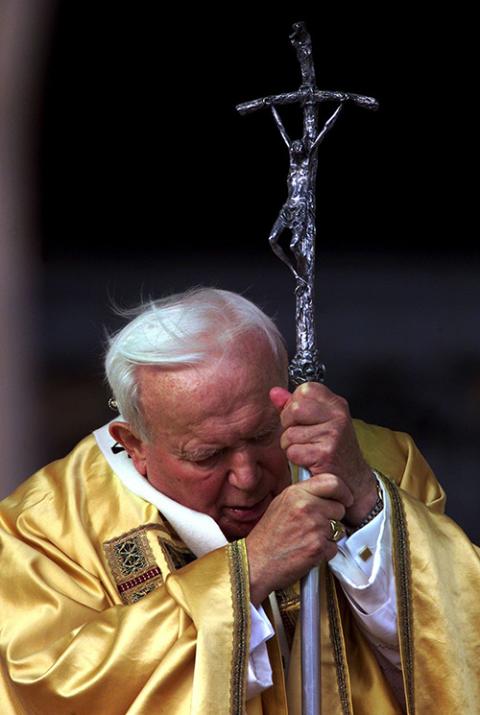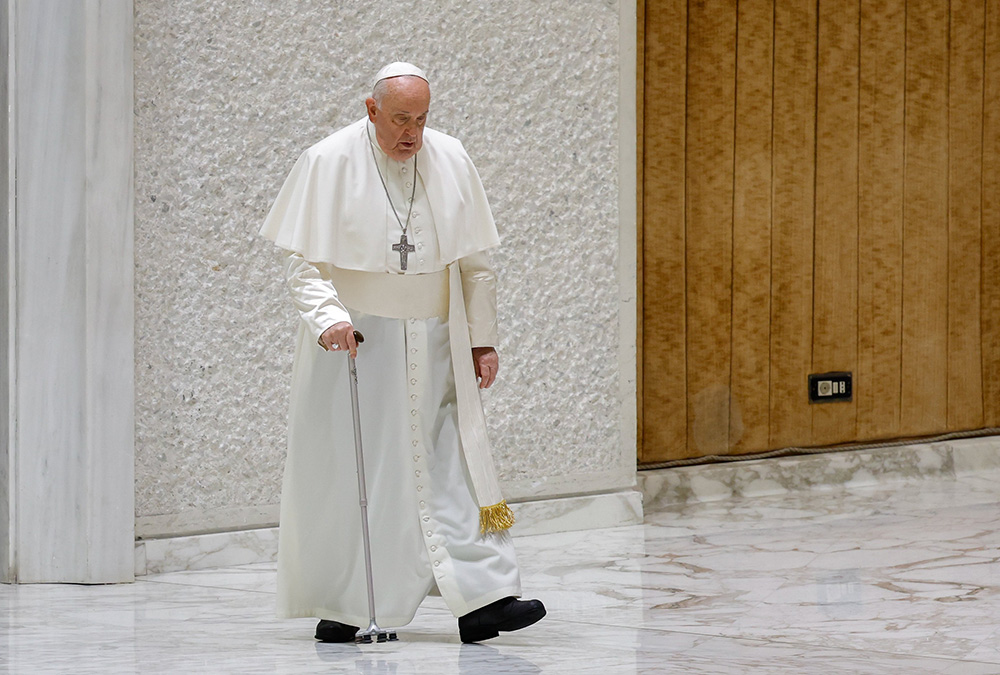
Pope Francis, walking with a cane, arrives in the Paul VI Audience Hall for his weekly general audience at the Vatican Dec. 6. (CNS/Lola Gomez)
With questions about both Joe Biden and Donald Trump's physical fitness and mental acuity dogging their respective presidential bids, the "age issue" has created no shortage of commentary and headaches for both campaigns.
Most American presidents have been in their 50s at the time of inauguration, so a likely 2024 contest between a late septuagenarian and an octogenarian has put the candidates' ages front and center. The Catholic Church, by contrast, has long been accustomed to more senior leaders.
During the 20th century — and for much of the modern era — most popes have been in their 60s or 70s at the time of their election. And for popes and presidents alike, age has invariably been considered to be both an asset and a liability.
Pope Francis, who turns 87 on Dec. 17, is already one of the oldest popes in the church's 2,000-year history. Another birthday puts the spotlight on an institution long defined by strict protocol. Behind Vatican walls, papal health privacy is considered to be paramount, policies about how to deal with aging popes are practically nonexistent, and talk of possible papal transition still remains largely taboo.
"Francis' pontificate has been long by historical standards, but not in comparison with some of the major papacies of the 20th century," observed papal historian Miles Pattenden of Oxford University. "Francis, on the other hand, is old compared to all of those 20th-century predecessors."
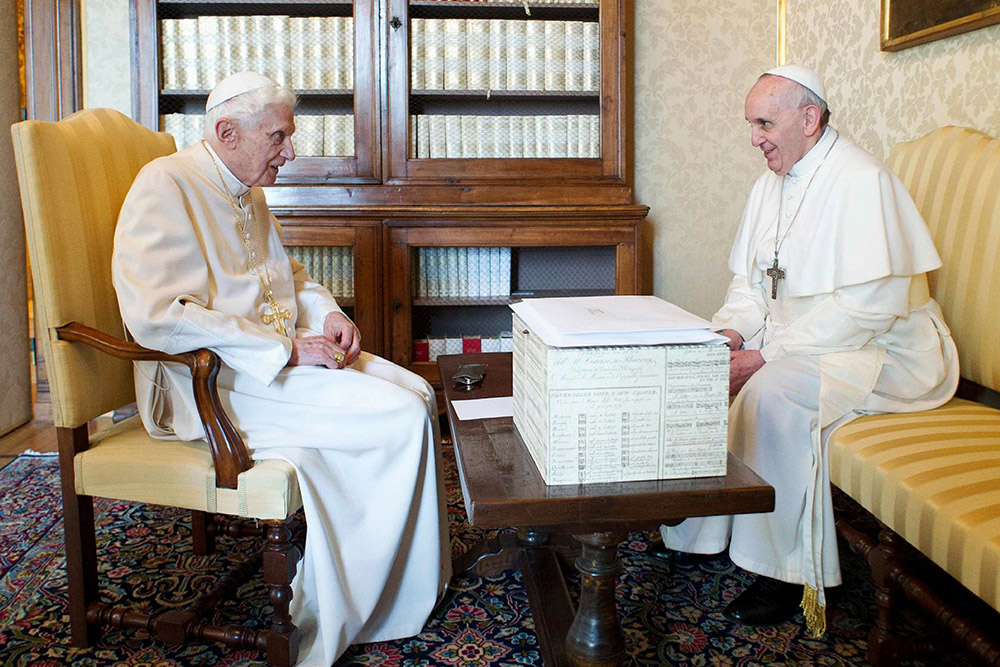
Pope Francis talks with retired Pope Benedict XVI at the papal summer residence at Castel Gandolfo, Italy, March 23, 2013. (OSV News/Vatican Media via Reuters)
While birthdays — or age — may be a relative factor in assessing one's governance, it does raise underlying questions about capacity.
"We're living longer and better," Christopher Bellitto, a church historian at Kean University in New Jersey, told NCR. "But what if a pope falls into a persistent vegetative state by reason of illness or assassination attempt?"
"What if dementia hits at 70 but his body is still strong?" he asked. "These situations make the continuing lack of protocols for an incapacitated pope a stunning omission."
Pope Benedict XVI's historic resignation in 2013, at the age of 85, came after he witnessed firsthand the physical decline of Pope John Paul II, which led to serious questions as to who was tasked with decision-making and control of the late pope during his final years.
"John Paul II said you don't come down from the cross," in reference to his end-of-life suffering, Bellitto recalled.
"We said: 'He taught us to live and now he's teaching us to die.' Beautiful and noble sentiments, but was he really in charge near the end? And if not, who was?" he asked. "Whoever it was did not have the charism of having been elected Peter's successor, that's for sure."
Bellitto believes that Francis — who as he nears 87 is in physical decline but mentally sharp — is "missing the opportunity" following Benedict's resignation to appoint a panel to study the questions and propose protocols for the nightmare scenario of a papal incapacitation.
While Francis revealed last year that he has already prepared his resignation letter to be used in the event of such an emergency, the circumstances surrounding how such a document could be used and implemented remain unclear.
"For an institution nearly always led by a senior citizen, you'd think they would have figured contingencies out already," said Bellitto.
A 'lame-duck' pope?
Francis is currently the fourth-oldest head of state in the world, just behind the leaders of Cameroon, the Palestinian Authority and Saudi Arabia.
Tim Naftali, a research scholar at Columbia University's School of International and Public Affairs and a presidential historian, said that a dozen popes have been over the age of 80, compared to only one U.S. president, the incumbent Biden.
"Seventy-year-olds are not viewed, necessarily, as being 'old,' as they were in my grandparents' generation," Naftali told NCR. "What isn't clear is whether that same holds true for 80 years old."
Over the past two years, Francis has struggled with mobility and had to cancel a trip to Dubai earlier this month due to bronchitis. Even so, in recent months the pope has acted decisively, if controversially, when his authority has been questioned.
Advertisement
In October, Francis took the rare step of publicly responding to cardinals questioning him on gay blessings and women's ordination. In November, his decision to take away the monthly stipend and housing of a fierce critic, traditionalist U.S. Cardinal Raymond Burke, sent shockwaves throughout the Catholic world.
These moves, said Naftali, could be interpreted as "a sign of renewed vigor" or as "a message to his opponents not to count an old man out yet."
While U.S. presidents coming to the end of their final term in office are often deemed "lame ducks," popes do not have to stand for reelection. Even so, said Pattenden, the sense that a pontificate is drawing to a close can have the same effect.
"The difference is one of timing: Only God, or the pope himself, can choose when his time is up," he said. "This means that the pope's 'lame duck' period can be considerably longer or shorter than that of an American president."
Sacred Heart Sr. Jean Bartunek, who is professor of management and organization at Boston College, said that on the world stage, Francis has been widely praised as a still-relied-upon leader when it comes to combating climate change, and intensely involved in calling for peace in Ukraine, Israel, Gaza and elsewhere.
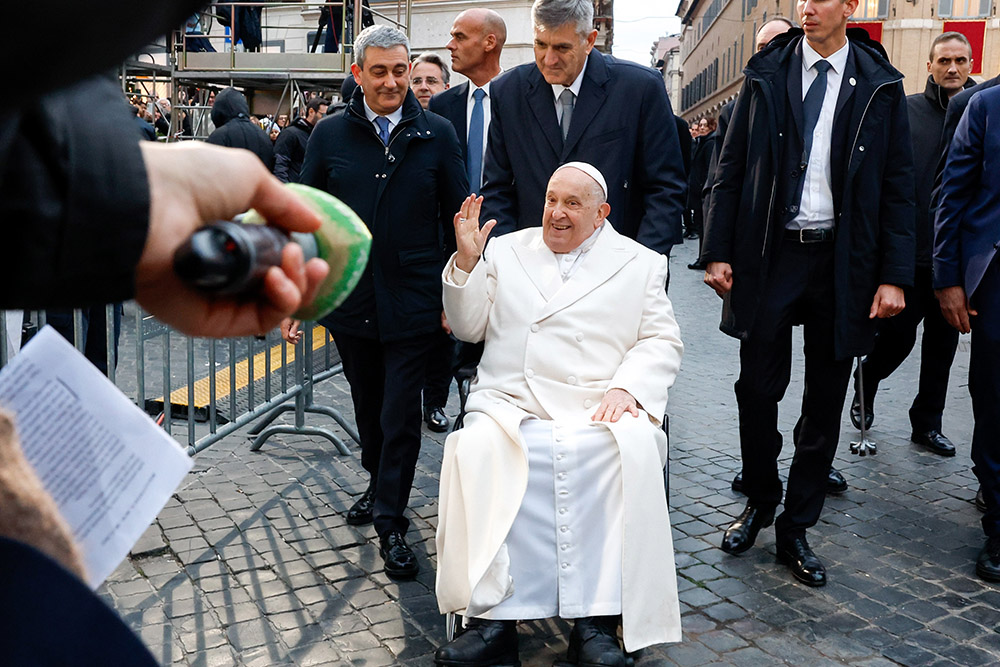
Pope Francis greets journalists gathered near a Marian statue by the Spanish Steps in Rome Dec. 8, the feast of the Immaculate Conception. (CNS/Lola Gomez)
And inside the church, she observed, the pope's emphasis on "synodality," has focused on dispersing and decentralizing power.
"I don't know how much age itself matters in this kind of setting, as long as the pope is capable of leading well and has competent and helpful and trustworthy advisers," she told NCR. "Certainly, he is recognized in the broader world as a transformational leader."
'Still alive'
Two years after his election, in 2015, Francis predicted that his papacy would be short: "Four or five years," he said. "I do not know, even two or three."
But as his papacy has progressed, the pope has proved indefatigable in his ambitions:
- Launching the ongoing, multiyear synod on synodality that could lead to sweeping reforms for church structures and ministries;
- Traveling on 44 international trips outside Rome in just over a decade (compared to John Paul II's 104 trips over the course of almost three decades);
- Significantly diversifying the College of Cardinals, leaving a lasting imprint on the elite body of men who both serve as his closest collaborators and will one day decide who succeeds him.
Along the way, he's spoken frequently and personally about the need to appreciate the wisdom of the elderly — even establishing the Catholic Church's first-ever annual World Day of Grandparents and the Elderly. Yet with two major hospitalizations over the last year, every birthday and every ailment put his own age into sharper focus.
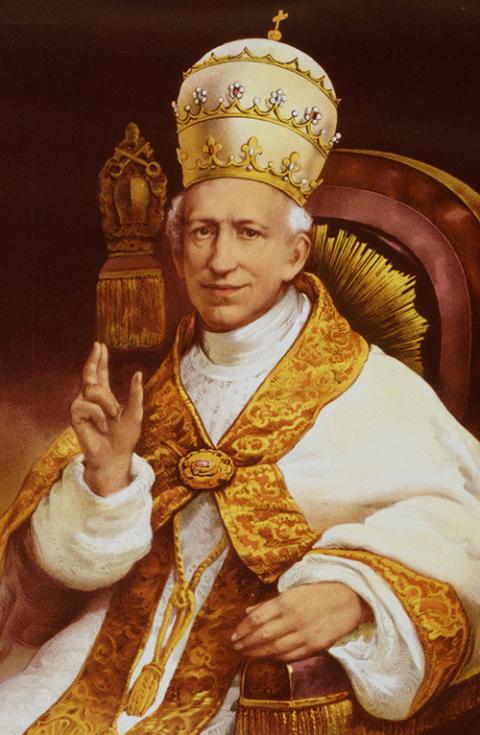
Pope Leo XIII in an official Vatican portrait circa 1878 (CNS/Library of Congress)
In looking back on papal history, Pattenden said he believes the most obvious comparison to Francis is likely the late-19th-century Pope Leo XIII, who reigned from 1878 to 1903.
"Like Francis, Leo was elected at what seemed a relatively advanced age, 67, and his age possibly counted in his favor as the cardinals sought a pope to take stock and consolidate after the dramatic changes to the church during Pius IX's long pontificate," he said.
Leo went on to live for 25 years and, according to Pattenden, "proved to be as impactful a pontiff as his predecessor, not least for his encyclical Rerum Novarum, still a foundational text for Catholic social activism and teaching."
Like Francis, Pattenden recalled, Leo endured speculation about his health, including predictions that he would not survive a surgery at age 89. In the end, he made it through. According to Pattenden, Leo was "as busy as ever" during the final four years of his life, including presiding over the first Plenary Council of Latin America in Rome, issuing some 15 encyclicals, and creating more than 30 new cardinals.
As Francis left Rome's Gemelli hospital last spring, he turned to reporters and quipped: "I am still alive" — a remark seemingly intended to provide an update on his present condition, but one that could also serve as a rejoinder to those skeptical of who is still in charge.
Even so, despite Francis' similarities to Leo XIII, Pattenden said he suspects that at this stage, "few in Rome believe his pontificate will last more than a few more years."
"That will already be factoring into their calculations — and machinations — as they ready themselves for whatever comes next."

